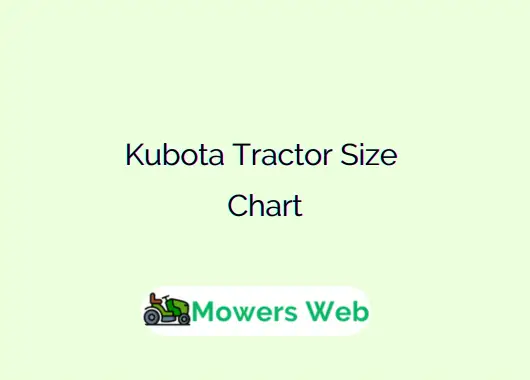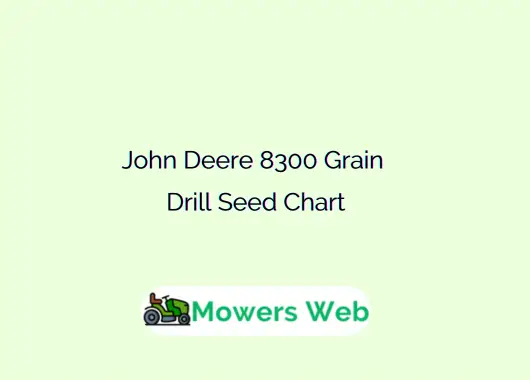Kubota organizes its lineup into distinct series, ranging from compact models for light-duty work to full-sized agricultural tractors for heavy operations.
Understanding the differences between these series helps you choose the right tractor for your tasks, property size, and budget.
Below is a complete Kubota tractor size chart with horsepower, weight, and common uses.
Kubota Tractor Size Chart
Sub-Compact Tractors
| Series / Model Range | Horsepower (HP) | Approx. Weight (lbs) |
|---|---|---|
| BX Series (BX1880, BX2380, BX2680, BX23S, BX2680V) | 16 – 26 HP | 1,300 – 1,700 lbs |
Compact Tractors
| Series / Model Range | Horsepower (HP) | Approx. Weight (lbs) |
|---|---|---|
| B01 Series (B2301, B2601, B2301HSD, B2601HSD) | 20 – 26 HP | 1,500 – 1,800 lbs |
| B50 Series (B2650, B3350, B3350SU, B2650HSD, B3350HSD) | 26 – 33 HP | 1,800 – 2,400 lbs |
| LX Series (LX2610, LX3310, LX3520, LX4020, LX20 Series) | 25 – 40 HP | 2,200 – 3,000 lbs |
| L01 Series (L2501, L3301, L3901, L4701) | 25 – 47 HP | 2,600 – 3,300 lbs |
| L02 Series (L2502, L3302, L3902, L4802, L2502D, L3302HST) | 25 – 48 HP | 2,700 – 3,500 lbs |
| Standard L Series (L2800, L3400, L3800, L3240, L3540, L3940, L4240, L4600, L5040, L5740) | 28 – 57 HP | 2,600 – 4,200 lbs |
| Grand L60LE Series (L3560LE, L4060LE, L3560HSTC-LE) | 35 – 45 HP | 3,400 – 4,000 lbs |
| L60 Series (L3560, L4060, L4760, L5060, L5460, L6060, L6060HSTC) | 35 – 62 HP | 3,700 – 4,500 lbs |
Related Kubota Tractor Battery Size Chart(For All Series + Models)
Mid-Size Utility Tractors
| Series / Model Range | Horsepower (HP) | Approx. Weight (lbs) |
|---|---|---|
| MX Series (MX4800, MX5200, MX5400, MX5800, MX6000) | 48 – 63 HP | 3,600 – 4,500 lbs |
| M60 Series (M5660SU, M6060, M7060, M5660SUH) | 57 – 71 HP | 4,800 – 6,200 lbs |
| M Series Legacy (M5640SU, M7040, M8540, M9540, M8540N, M9540 Low Profile) | 56 – 95 HP | 4,500 – 7,300 lbs |
Utility Tractors
| Series / Model Range | Horsepower (HP) | Approx. Weight (lbs) |
|---|---|---|
| M4 Series (M4-063, M4-071, M4D-061, M4D-071, M4N-071) | 63 – 74 HP | 5,200 – 6,300 lbs |
| M5 Series (M5-091, M5-111, M5N-091, M5N-111, M5L-111) | 85 – 118 HP | 6,500 – 8,500 lbs |
| M6 Series (M6-101, M6-111, M6-121, M6-131, M6-141, M6S-111, M6H-101) | 97 – 141 HP | 8,500 – 11,000 lbs |
| M6 Utility (M6U-111, M6U-131) | 110 – 133 HP | 9,200 – 10,800 lbs |
Related John Deere Lawn Mower Comparison Chart(For All Models + Series)
Agricultural Tractors
| Series / Model Range | Horsepower (HP) | Approx. Weight (lbs) |
|---|---|---|
| M7 Gen 2 Series (M7-132, M7-152, M7-172, M7-132P, M7-152P, M7-172P, M7-172 Premium KVT) | 128 – 188 HP | 13,000 – 15,000 lbs |
| M8 Series (M8-191, M8-211, M8-191 Premium, M8-211 Premium KVT) | 190 – 210 HP | 21,000 – 24,000 lbs |
Specialty Tractors
| Series / Model Range | Horsepower (HP) | Approx. Weight (lbs) |
|---|---|---|
| Narrow M Series (M4N-071, M5N-091, M5N-111, M6N-101) | 73 – 114 HP | 6,000 – 9,000 lbs |
| Low-Profile Series (M5L-111, M6L-111, M6L-131) | 111 – 133 HP | 8,800 – 10,500 lbs |
| Orchard/Vineyard (M95SDT, M105SDT, M5101N, M5111N) | 95 – 113 HP | 7,000 – 9,500 lbs |
| High-Clearance (M6H-101, M6U High Clearance) | 101 – 133 HP | 9,500 – 11,000 lbs |
Related Electric Lawn Mower Comparison Chart(For All Brands + Models)
Choosing the Right Kubota Tractor Size
Kubota’s tractors are grouped based on the size and purpose of use. Here’s a breakdown of how to match your needs with the right series:
1. Small Lawns or Gardens (0–5 acres):
Choose from the BX or B01 Series. These sub-compact models are affordable, maneuverable, and easy to maintain. They are ideal for mowing, garden work, and light loader use.
2. Mid-Sized Properties (5–15 acres):
The LX or L02 series provides more horsepower and stronger hydraulics. Perfect for landscaping, maintaining driveways, and small farm operations.
3. Large Acreages (15–50 acres):
For bigger properties or farm chores, consider the MX or M60 Series. They offer robust loader performance, durable frames, and excellent reliability.
4. Commercial Farming and Heavy Work (50+ acres):
The M5, M6, and M7 Series are professional-grade tractors that can handle tillage, haying, and field cultivation with ease. They are designed for demanding workloads and extended operating hours.
5. Specialized Operations (Orchards, Vineyards, Barns):
The Narrow and Low-Profile M Series are engineered for confined spaces but still deliver strong power and lift capabilities.
Related Commercial Zero Turn Mower Comparison Chart(All Models)
Understanding Tractor Size and Weight
Tractor size is determined not only by horsepower but also by frame size, weight, and hydraulic capacity. As horsepower increases, the tractor’s chassis becomes larger and heavier to support additional lifting power and attachments.
- Lightweight models (1,300–2,800 lbs) are better for lawns and landscaping.
- Mid-weight tractors (3,000–6,000 lbs) can handle small farm work and loader operations.
- Heavy-duty models (6,000–13,000 lbs and above) are built for full agricultural or commercial work.
Related Push Mower Comparison Chart(For All Make + Models)
Why the Size Chart Matters
Understanding the Kubota tractor size chart is essential for buyers and equipment owners. It helps:
- Match equipment to tasks – Avoid over- or under-buying.
- Plan attachments – Ensure compatibility with implements and loaders.
- Assess transport needs – Heavier tractors require stronger trailers and tow vehicles.
- Compare models easily – The chart gives a quick overview of power and capacity differences.
For instance, upgrading from a BX2380 (25 HP) to an L3302 (33 HP) can increase loader lift by nearly 40%, making heavier chores easier without stepping into the utility class.
Final Thoughts
Kubota offers one of the most complete tractor lineups in the market, ranging from compact sub-utility units to full-scale agricultural workhorses. Whether you are maintaining a small homestead or managing hundreds of acres, understanding the Kubota tractor size chart ensures you select the right model for your land and workload.
By matching horsepower, weight, and features to your specific needs, you’ll get the most out of your investment and enjoy years of reliable performance from your Kubota tractor.




